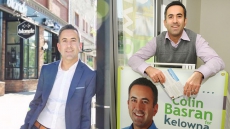OTTAWA — Democratic Institutions Minister Maryam Monsef struck a conciliatory tone Wednesday as she made the case for changing the way Canadians cast their ballots in federal elections.
"Electoral reform, to be successfully achieved, should be built on co-operation amongst political parties and have the broad-based support of Canadians," Monsef said as she appeared as the first witness before the House of Commons special committee on electoral reform.
Monsef urged her colleagues to reach for a compromise that takes into account the views of all Canadians when it comes to figuring out the best alternative to the current first-past-the-post voting system, rather than coming up with five separate reports outlining the position of each political party.
"This is not to suggest that electoral reform should not cause much debate and discussion," Monsef said, according to an advance copy of her notes.
"Each of us, as parliamentarians, has a responsibility to provide Canadians with a variety of perspectives on how we move forward on this and indeed on any issue. Providing Canadians with vigorous study and debate is key to this process, and not doing so would be a disservice and unlikely to achieve fundamental reform," she said.
Last month, the Trudeau government gave up its majority of seats on the committee, hoping to do away with the notion that it is trying to rig the electoral system so that it benefits the governing Liberals.
The current makeup of the committee, proposed by the New Democrats, is meant to reflect each party's share of the popular vote in the 2015 election.

That means there are five Liberals, three Conservatives, two New Democrats, one Bloc MP and May — all with voting rights.
Monsef made the case for getting rid of the first-past-the-post system in her appearance Wednesday, calling it an antiquated system not designed to operate within multi-party parliamentary democracy.
"We require an electoral system that provides a stronger link between the democratic will of Canadians and election results," Monsef said.
The Conservatives have been pushing for a referendum, but Monsef says she remains to be convinced it is the best way to decide complex issues.
"They can and have often led to deep divisions within Canadian and other societies, divisions which have not been easily healed," she said.
Monsef also says she is open to online voting, one of the issues the committee is tasked with exploring.
Monsef also unveiled a discussion guide on electoral reform meant to help Canadians take part in the conversation.

The guide, available online, walks people through alternative voting systems, gives tips on how to host a public meeting about electoral reform, including sample invitations to put out on social media and a list of questions to get people talking.
The committee must submit its final report by Dec. 1.




